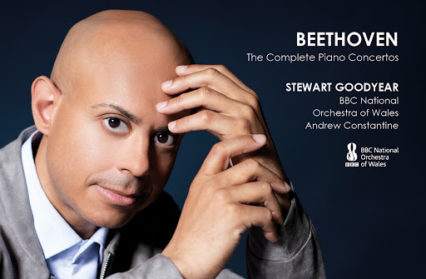David Truslove delves into a new album from Orchid Classics; Beethoven’s complete piano concertos from Stewart Goodyear and Andrew Constantine with BBC National Orchestra of Wales.
Delving into recent recordings from the BBC National Orchestra of Wales makes intriguing listening. Chief amongst the variety of British composers championed this year are Christopher Gunning, Nicholas Maw and Philip Sawyers. If those names don’t ring any bells, you may be unlikely to recognise the Rumanian Călin Humă whose Fourth Symphony has just been issued via Guild Music. There’s also been a new release of music by Gustav Mahler, Alban Berg and Rhian Samuel. But it’s not all left field planning, indicated by the very welcome arrival of a new disc of Beethoven’s complete piano concertos (coinciding with the composer’s 250th anniversary year) in a scrupulously prepared collaboration between BBC NOW, conductor Andrew Constantine and Canadian pianist Stewart Goodyear issued by Orchard Classics.
The orchestra clearly relish these concertos and perform them with a gratifying freshness and vitality, sensitive to a fault and demonstrating a real affection, as if collectively shaking hands with a much-loved friend. With just a nod to historically informed performance, strings are obligingly lean, woodwinds agreeably responsive, brass suitably festive, but never over blown, and timpani always considerate to the mood. Throughout, Constantine creates flowing, well-judged accounts in respect to balance, phrasing and tempi. If there are any quibbles it would in the well-behaved orchestral tuttis, which tend to be somewhat ordinary, just missing edge-of-seat excitement. That said, if it’s neat and tidy you’re after, these are handsome, polished performances that bear repeated listening.
Of course, this new release joins an already crowded market, where one might muse on distinguished rivals such as Aimard/Harnoncourt, Arrau/Davis and Pires/Harding. Nor should we ignore others such as Perahia/Haitink, Pollini/Harding or the celebrated Canadian Glenn Gould. Fortunately, the BBC NOW and Andrew Constantine have an established recording association and Stewart Goodyear has built a respectable catalogue of recordings, that include cornerstones of the Romantic concerto repertoire and a complete traversal of Beethoven’s piano sonatas.
Indeed, Goodyear’s preoccupation with Beethoven originated at the startlingly early age of three when he listened to all 32 piano sonatas in a day. The symphonies followed a few years later and his immersion in the concertos began at nine when he entered a national competition in Canada. Now forty-two and with a solid reputation as both pianist and composer, one might wonder if Goodyear’s fixation on Beethoven has paid off. In broad terms the answer is yes, but with one or two caveats. His playing is clean, spry and technically assured, yet I don’t sense an overview of the composer who charts a progression from Classical beginnings to burgeoning Romantic sensitivity, his approach too uniform and with a limited range of expression.
While there’s plenty of poise in the slow movements, room-stilling intimacy emerges only fitfully; the ‘Emperor’ has it in spades and there’s plenty of involvement in the spaciously taken C minor Concerto, but the first two never rise above the politely expressive. The Fourth sounds more aloof than plaintive and given insufficient bite by the orchestra in the opening bars. Perhaps I had become accustomed to the more aggressive stance from Paul Lewis & Jiří Bělohlávek.
On the plus side there’s plenty of youthful élan in Rondo movements, especially in the earliest concertos; rollicking good humour in the First and impish glee in the Second; precise but not overly fast – Evgeny Kissin makes this movement sound like a steeplechase. It’s also good to hear the longer of the three cadenzas Beethoven conceived for the C major Concerto (published as the first but written second), regardless of arguments as to its weight in relation to the rest of the movement. There’s an ink-still-wet quality to the playing in the opening movements of these early concertos and much to enjoy in the crisp pianism of the Third Concerto’s finale, its rhythmic punch and grandstand finish (timpani to the fore) both finely achieved. Tensions are sustained admirably in the pulse-raising finale of the Fourth, its excitement making up for the somewhat tepid opening Allegro, where eloquent playing is traded for underpowered climaxes. The heroic bravura of the ‘Emperor’ is effectively realised, outer movements authoritative and stylish.
All in all, this is a highly enjoyable three-disc set exhibiting commendable poise and clarity, owing much to the production team from Orchid Classics who recorded these concertos in Cardiff’s Hoddinott Hall between 4-14 September 2018. Definitely worth investigating.
David Truslove is a regular contributor to Wales Arts Review’s music section.











